|
ISLAM]
How I became a Muslim
I would like to stress that I did not come into contact with any
Muslim before I embraced Islam. I read the Qur’an first and realized
that no person is perfect, Islam is perfect, and if we imitate the
conduct of the Holy prophet (PBUH) we will be successful. May Allah give
us guidance to follow the path of the Ummah of Muhammad (PBUH).
|

Yusuf Islam (Cat Stevens) during his pop star days |
As human beings we are given a consciousness and a duty that has
placed us at the top of creation.
Man is created to be God’s deputy on earth and it is important to
realize the obligation to rid ourselves of all illusions and to make our
lives a preparation for the next life, anybody who misses this chance is
not likely to be given another, to be brought back again and again,
because it says in the Holy Qur’an that when man is brought to account,
he will say, “O lord, send us back and give us another chance. The Lord
will say, if I send you back you will do the same.”
Pop star Cat Stevens
I started making music. I wanted to be a big star. All those I saw in
the films and on the media took hold of me, and perhaps I thought this
was my God, the goal of making money I had an uncle who had a beautiful
car. Well, I said , ‘he has it made,’ he had a lot of money. The people
around me influenced me to think that this world was their God.
I decided then that this was the life for me, to make a lot of money,
have a ‘great life’.
Now my example were the pop stars, I started making songs, but deep
down I had a feeling for humanity, a feeling that if I became rich I
will help the needy (it says in the Qur’an, we make a promise, but when
we make something we want to hold on to it and become greedy).
|
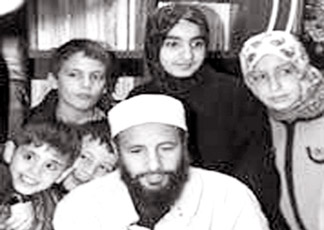
Yusuf Islam now with his family in hospital |
So what happened was that I became very famous, I was still a
teenager, my name and photo were splashed in all the media. They made me
larger than life, so I wanted to live larger than the life and the only
way to do that was to be intoxicated (with liquor and drugs).
After a year of financial success and ‘high’ living, I became very
ill, contracted TB and had to be hospitalized. It was then that I
started to think; what was to happen to me? Was I just a body and my
goal in life was merely to satisfy this body?
I realized now that this calamity was a blessing given to me by Allah
a chance to open my eyes, ‘why am I here, why am I in bed’, and I
started looking for some of the answers. At that time there was great
interest in the Eastern mysticism I began reading and the first thing I
began to become aware of was death, and that the soul moves on, it does
not stop.
I felt I was taking the road to bliss andhigh accomplishment I
started meditating and even became a vegetarian. I now believed in
‘peace and flower power’, and this was the general trend.
But what I did believe in particular was that I was not just a body,
this awareness came to me at the hospital.
I also wrote another song ‘The way to find God out.’ I became even
more famous in the world of music. I really had a difficult time because
I was getting rich and famous and at the same time sincerely searching
for the truth.
The Qur’an
My uncle who came to London brought back a translation of the Qur’an,
which he gave to me. He did not become a Muslim, but he felt something
in this religion, and thought I might find something in it also.
And when I received the book, (a guidance that would explain
everything to me: who I was? What was the purpose of life? What was the
reality and what would be the reality, and where I came from?
I realized that this was the religion not in the sense the West
understands it, not the type for only your old age. In the west whoever
wishes to embrace a religion and make it his only way of life is deemed
a fanatic.
I was not a fanatic; I was at first confused between the body and the
soul. Then I realized that the body and the soul are not apart and you
don’t have to go to the mountain to be religious; we must follow the
will of God, then we can rise even higher than the angels. The first
thing I wanted to do now was to be a Muslim.
I realized that everything belongs to God, that slumber does not
overtake Him. He created everything. At this point I began to lose the
pride in me, because hereto I had thought the reason I was here was
because of my own greatness.
But I realized that I did not create myself, and the whole purpose of
my being here was to submit to the teaching that has been perfected by
the religion we know as Al-Islam. At this point I started discovering my
faith; I felt that I was a Muslim, on reading the Qur’an. I now realized
that all the Prophets sent by God brought the same message.
The Qur’an asks you to reflect and reason, and worship the One who
has created everything. The Qur’an asks man to reflect upon the sun and
moon and God’s creation in general. Do you realize how different the sun
is from the moon? They are at varying distances from the earth, yet
appear the same size to us; at times one seems to overlap the other.
Even when many of the astronauts go to space, they see the
insignificant size of the earth and vastness of space; they become very
religious, because they have seen the Signs of Allah.
When I read the Qur’an further, it talked about prayer, kindness and
charity. I was not a Muslim yet, but I felt that the only answer for me
was the Qur’an, and God had sent it to me and, I kept it a secret. But
the Qur’an also speaks on different levels. I began to understand it on
another level, where the Qur’an says “Those who believe don’t take
disbelieves for friends and the believer are brothers”. Thus at this
point I wished to meet my Muslim brothers.
Conversation: Then I decided to journey to Jerusalem (as my brother
had done). At Jerusalem, I went to the mosque and sat down. A man asked
me what I wanted. I told him I was a Muslim. He asked what my name was;
I told him ‘Stevens’. He was confused.
I then joined the prayer though not so successfully. Back in London,
I met a sister called Nafisa. I told her I wanted to embrace Islam and
she directed me to the new Regent Mosque. This was in 1977, about 1 year
after I received the Quran. Now I realized that I must get rid of my
pride, get rid of Satan and face one direction.
So on a Friday, after Friday prayer I went to the Imam and declared
my faith (the Kalima) at his hands. You have before you someone who had
achieved fame and fortune. But guidance was something that eluded me, no
matter how hard I tried until I was shown the Qur’an. Now I realize I
can get in direct contact with God.
But Islam removes all these barriers; the only thing that moves the
believers from the disbelievers is Salat. This is the process of
purification. Finally I wish to say that everything I do is for the
pleasure of Allah.
Source: al-shia.org
Parents are precious
Observe complete respect and reverence to your father and mother, for
they are the most worthy of your consideration. Imam Al-Bukhari and Imam
Muslim reported that a man asked the Prophet (PBUH), “Oh Messenger of
Allah, who is the most worthy of my best conduct?”
He answered: ‘Your mother! Your mother! Your mother! Then your
father, then the next, and the next.’ Imam Al-Bukhari in Al-Adab Al-Mufrad
and Abdul Razzaq in his Musanaf (the wording is his) reported that
Hisham bin ‘Urwa recounted that his father told him that Abu Hurairah
radiallahu anhu saw a man walking ahead of another. He asked him: ‘How
is this man related to you?’ ‘He is my Father,’ the man answered. Abu
Hurairah told him: ‘Do not walk ahead of him, do not sit until he sits,
and do not call him by his name.’
According to Ibn Wahab, a student of Imam Malik bin Anas named Imam
‘Abdul Rahman bin Al-Qasim Al-’Utaqi Al-Masri (132-191 AH), said: ‘While
Imam Malik was reading Al-Muwata to me he suddenly stood up for a long
while, then he sat again.
He was asked why, and he answered: ‘My mother came down asking me
something. Since she was standing I stood up respectfully, when she
went, I sat back down.’
The revered follower Tawoos bin Kisan said: ‘It is part of the Sunnah
to respect four persons: a scholar, an elder, a leader, and a father. It
is considered rude that a man call his father by his name.’ At the end
of his book of Malkite Fiqh Al-Kafi, Imam Bin ‘Abdul Al-Barr said:
‘Kindness to the parents is an obligatory duty and by the grace of Allah
it is an easy matter.
Kindness means to be humble with them, to speak to them nicely, to
look at them with love and respect, to speak in a mild tone that does
not surpass theirs unless they are hard of hearing, to give them
complete access to your own wealth, and to offer them the best of your
food and drink.’
Children should not walk ahead of their parents, nor speak ahead of
them in matters that they know are their father’s. Children should
wholeheartedly avoid upsetting their parents and should seek their
pleasure as much as possible. Making your parent’s life enjoyable is one
of the most virtuous acts.
Children must hasten to respond to their parents’ call. If a child is
praying voluntarily, he/she should shorten the prayer and respond
promptly. Children should express only good words.
In return, it is the parents’ duty to make it easier for their
children to be kind to them by being kind and generous to their
children, but without Allah’s help people cannot become obedient, nor
can they perform his commands.’You may encounter various difficulties
while serving your mother and father, but do not forget that their
rights are multiples of these difficulties. For this Allah said in the
Qur’an:
“And Your Lord has decreed that you worship none but Him, and that
you be dutiful to your parents. If one of them or both of them attain
old age in your life, say not to them a word of disrespect, nor shout at
them but address them in terms of honor.
And, out of kindness lower to them the wing of humility, and say: ‘My
Lord bestows mercy on them as they cherished me in childhood.” (Surah Al
Isra : Ayah 23-24)
Keep in mind that everyone likes to be the best in status, prestige
and popularity, and hates to see someone better than himself or herself.
Only your parents would wish that you become better than what they are.
How should you treat those who prefer you to themselves and wish you
better.
Islam in Central Asia
Since the collapse of the Soviet Union in 1991, the Central Asian
republics have seen a revival of Islam. The process kicked off quickly
as Islam has always had deep roots in the region. Most Central Asians,
when asked this question, give one answer: “Al-hamdulillah, I am.” The
use of the Arabic phrase for “praise be to Allah” emphasizes the
strength of their faith. The reply comes as no surprise because most of
the peoples of Central Asia have historically been Muslims.
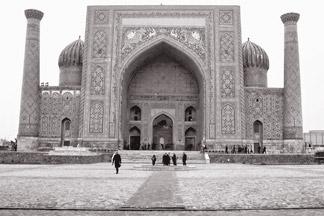 |
|
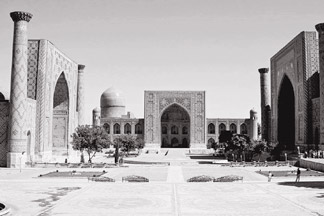
Registan Square -Samarkand |
The region is profoundly Muslim while at the same time historically
inclusive and tolerant. According to regional surveys, some 95 percent
of the members of those historically Muslim populations consider
themselves Muslim today.
I have no special knowledge of Islam, but Al-hamdulillah, I am a
Muslim,” said one man in the Tajik capital, Dushanbe. “Islam teaches us
to avoid bad behavior, to be honest, not to be drunk, and respect human
beings, to have an open mind and a soft heart. If we do not follow these
rules, we are not followers of Prophet Muhammad. (PBUH)
It was the drive to spread the message of Islam the Muslims entered
Central Asia .The opening of Central Asia and the implementation of
Islam was completed in the eighth century ADThis brought to the region a
new belief and culture that until now continues to be dominant. The
early Muslims were led by a brilliant general, Qutaybah ibn Muslim, and
were highly motivated by the desire to spread the Islamic ideology.
The Arrival of Islam
The new way of life brought by the Muslims spread throughout the
region. The native cultures were replaced in the ensuing centuries as
Islam molded the people into a single community - the Islamic ummah.
During the height of the Abbasid Caliphate in the eighth and the ninth
centuries, Central Asia experienced a truly golden age.
Bukhara became one of the leading centers of learning, culture, and
art in the Muslim world, its magnificence rivaling contemporaneous
cultural centers such as Baghdad, Cairo, and Cordoba. Some of the
greatest historians, scientists and geographers in the history of
Islamic culture were natives of the region, and one of the copies of the
Noble Quran originally prepared in the time of Caliph Uthman is kept in
Tashkent. The new Islamic spiritual and political situation in Central
Asia determined a new technological and cultural progress. It marked the
production of the Samarkand paper which supplanted papyrus and parchment
in the Islamic countries at the end of the 10th century.
Furthermore scientists such as al-Khorezmi, Beruni, Farabi, Abu Ali
ibn Sino (Avicenna) brought fame to the area all over the world,
generating respect across the world, and many scientific achievements of
the epoch made a great impact on the European science (it is enough to
mention the astronomical tables of Samarkand astronomers from Ulughbek’s
observatory). During the comparatively peaceful era of Islamic rule,
culture and arts flourished in Central Asia.
Soviet rule in Central Asia
The Communist authorities of the Soviet Union (1917-1991) inherited
Central Asia from the old Tsarist Empire which collapsed during the
First World War. The Communists viewed Islam with hostility and
suspicion and tried to replace the regions Islamic identity and loyalty,
with ethnically created republics.
Islam survived under the Soviet Union as the state after the Second
World War sought to bring in certain aspects of Islam and tried to
incorporate them within the state?s structure. This led to a Soviet
‘official Islam’, sanctioned and acceptable to the regime and an
‘underground Islam’ which sought to keep alive pre-Soviet ideas and
practices.
Creating Central Asian Republics
Central Asia was one country known as Islamic Turkmenistan until the
communist revolution. Under Soviet regime it was divided into five
different administrative units such as Azerbaijan, Uzbekistan,
Kazakhistan, Tajikistan and Kyrgyzstan. Stalin created Uzbekistan and
Turkmenistan in 1924,
Tajikistan in 1929 and Kazakhstan and Kyrgyzstan in 1936. ‘The
Soviets had clear political reasons, policy of divide and rule, for
dividing ‘Turkistan’, into five new republics. Moscow did not desire the
creation of an ‘Islamic Turkistan’ to be a singular republic within the
Union of Soviet Socialist Republics (USSR).’
Kunya-Urgench was a major trade center on the Silk Road from the
10th-14th centuries, and the capital of Khorezm region. It was argued
that - ‘Stalin drew the map of Soviet Central Asia for the purpose of
reducing the prospects for regional unity. Five separate republics were
formed, creating national units for ethnic communities that had yet to
think of themselves as distinct nationalities. Moreover, boundaries were
set to insure the presence of large irredentist populations in each
republic.
|
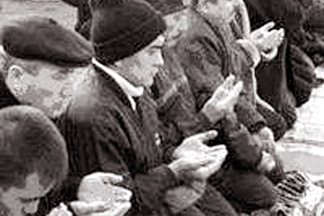
Kazak Muslims praying |

Astana City Mosque -Kazakhstan |
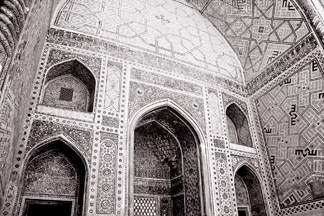
Legacy of Islamic civilization |
When the Soviet Union collapsed in 1991, the Central Asian states had
independence thrust upon them. They did not actively seek it.
Furthermore, there no were strong nationalist movements in Central Asia
seeking independence. None of the Central Asian states had a history of
national existence prior to either the Soviet Union or that of the
Tsarist Empire.
Hence, the primary source of loyalty of Central Asian peoples under
the Soviet Union was not the Communist State. Rather, multiplicities of
loyalties existed and continue to do so. These loyalties range from the
clan, tribe, family, and republic and to Islam, with Islam having a
powerful influence on social identity. Upon independence, Islam competed
with peoples loyalties to the new states.
The resurgence of Islamic expression throughout the Soviet Union in
the 1980s was the direct result of Gorbachev’s policies of Perestroika
and Glasnost. Such policies relaxed the Soviet Union’s rigid
authoritarianism and permitted a modicum of free expression to exist.
This embryonic Islamic resurgence was felt in those areas that were
traditionally deeply religious such as the Fergana Valley. For Uzbeks,
Tajiks and Kyrgyz this was an extremely important development. It
showed their desire to break with the Soviet Communist ideology as well
as Russian and Slavic culture and a desire to reassert their own
cultural identity and belief systems. There was a great upsurge in the
study of Islam and Arabic, with many Central Asian youth studying
Islamic courses abroad.
However the people of Uzbekistan, Turkmenistan, Kazakhstan,
Kyrgyzstan and Tajikistan have always lived under despots. Their history
is so dismal that Communism for them was a time of relative prosperity.
Now, 20 years after they became independent nations, they have once
again become sultanates, ruled by tyrants who maintain tight control of
political and economic activity.
The elite’s of Central Asia, by and large are Soviet legacies, as are
the new states. Since independence Central Asia’s former Soviet elite?s
have clung to power ruthlessly. All the Central Asian regimes have
reverted to the policies that the Soviet Union adopted in dealing with
Islam. Each regime has sponsored a particular version of Islam which the
state approves of and is non-threatening to the status quo.
Source: Khurasaan.com |



